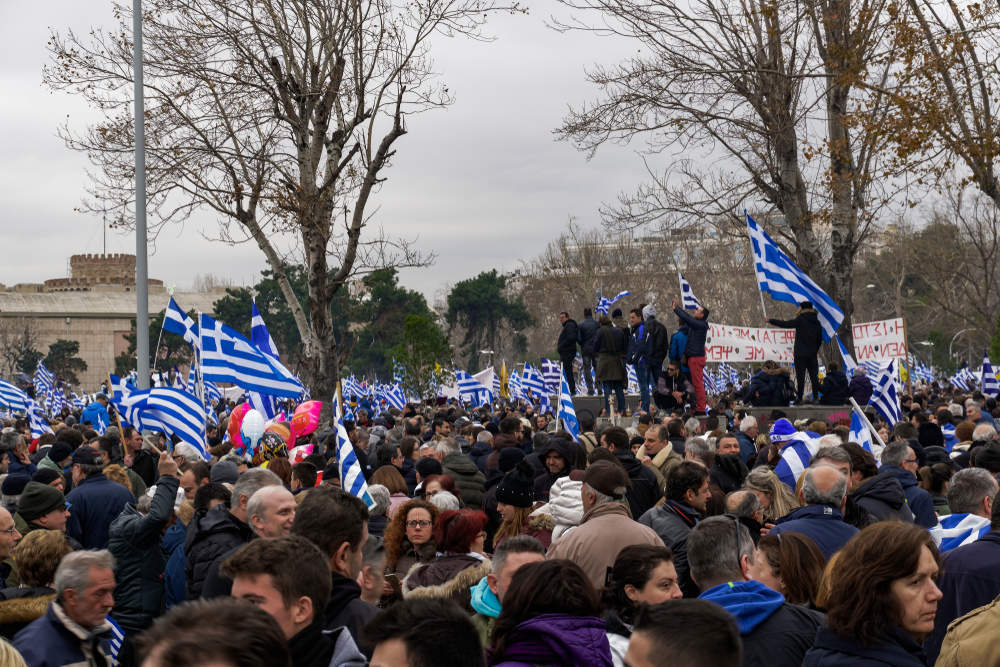
Macedonia hopes to end its decade-long row with Greece about its name ahead of the July Nato summit.
The two countries have been engaged in tense negotiations since 1995 over the name of Macedonia.
In 1991, Macedonia declared independence from the Yugoslav Federation because of ethnic concerns about Serb domination.
Two years later Macedonia was admitted to the UN as the Former Yugoslav Republic of Macedonia (FYROM). The name was determined with the qualifier as a result of Greek pressure.
In the summer of 2017, FYROM elected a new social democratic government led by prime minister Zoran Zaev. This had led to a radical change of approach towards the name dispute with Greece.
This move by the Macedonian government is primarily linked with FYROM’s desire to join the EU and NATO.
How well do you really know your competitors?
Access the most comprehensive Company Profiles on the market, powered by GlobalData. Save hours of research. Gain competitive edge.

Thank you!
Your download email will arrive shortly
Not ready to buy yet? Download a free sample
We are confident about the unique quality of our Company Profiles. However, we want you to make the most beneficial decision for your business, so we offer a free sample that you can download by submitting the below form
By GlobalDataThe EU unveiled a plan a fortnight ago to give membership to Balkan States, including FYROM, once they have settled disputes with EU members.
Greece’s concerns about Macedonia’s name has pushed it to block the former Yugoslav republic’s accession to NATO in 2008. Greece has said it will block EU membership if Macedonia seeks it.
The previous FYROM government was led by nationalist parties who undertook a policy of antiquisation, which involved appropriating Greek symbols and figures, especially that of Alexander the Great.
In a gesture of goodwill to help facilitate diplomacy, Zaev announced that the country’s international airport and main highway which are currently named after Alexander the Great will be renamed.
He also declared that Macedonia would compromise on its name and add a geographical qualifier.
Athens responded positively. The official Greek position for many years has been for Macedonia to have a compound name like New Macedonia, Upper Macedonia or Northern Macedonia.
Talks were held between the Foreign Ministers of the two countries and UN special envoy Matthew Nimetz who has overseen previous negotiations.
More talks are planned between leading figures in Macedonian and Greek governments in the coming months.
What was said:
Macedonian Prime Minister, Zoran Zaev, told Austrian radio station ORF:
“I believe we will be able to conclude the negotiations successfully by the NATO summit in July.”
“We have an automatic invitation, meaning NATO Members will start ratifiying our [NATO] accession as soon as we and Greece announce that the problem has been solved.”
Macedonia’s Foreign Minister, Nikola Dimitrov told reporters in Sofia:
“It’s better to cooperate and compete on things that matter today than compete on who had more glorious victories and defeats in our rich history.”
“We have the same approach towards the difference we have with Greece.”
UN mediator, Matthew Nimetz said the meeting between Macedonian Foreign Ministers was “positive and crucial.”
He continued:
“I believe deeply that this is the right time to try to break through on this issue, solve it finally, move forward in the region with the two countries in friendship and cooperation.”
EU Enlargement commissioner Johannes Hahn said he is “very confident” the dispute will be settled by July.
Background:
Greece objects to the former Yugoslav republic being called Macedonia because it has a northern region of the same name.
It claims Macedonia’s name implies a territorial claim and cultural appropriation over Greece as a whole as well as its Macedonia region.
Athens claims that the country of FYROM’s use of the name Macedonia undermines its culture and heritage since Alexander the Great, a national hero, ruled over the ancient Greek kingdom of Macedon. Athens see the name Macedonia as inseparable from Greek culture.
The concerns about territorial claims are linked to Article 49 of Macedonia’s constitution, which states:
“The Republic of Macedonia cares for the statue and rights of those persons belonging to the Macedonian people in neighbouring countries, as well as Macedonian ex-parties, assists their cultural development and promotes links with them.”
The background of these concerns originate in the Second World War and the Balkan Wars when Greece claims the Yugoslavian Federation made clear its territorial ambitions towards Greek Macedonia, including a desire to make the Greek city Thessaloniki the capital of a united independent republic of Macedonia.
Macedonia responds by disputing Greek claims about Macedonia being inseparable from Greece – they claim that Macedonians were a separate European people with their own customs, traditions and language to the Greeks.
Both sides claim that the name dispute violates their rights to self-determination.
What this means:
Although the governments and the international community are optimistic about a successful resolution of the name dispute in 2018, large swathes of the populations of both Macedonia and Greece remain discontented about the situation.
The existing contentious nature of the issue is noted by experts.
George Tzogopoulos, an international relations expert at BESA Center, an Israeli think tank, told the BBC:
I don’t understand why so many people are optimistic.
There are important differences between the two sides. Greece wants a name which would be used around the world, not just between the two countries. And that would require Skopje to change its constitution.
Despite the recent warming of relations between the two governments, over one million people demonstrated against Macedonia’s name. This protest was larger than those against EU imposed austerity measures imposed on the country in 2009.
The central slogan was Hands Off Macedonia.
A recent opinion poll see by Reuters showed that the majority of Greek oppose the use of the word Macedonia in any solution.
The Macedonians are slightly more realistic since their country has a lot to gain from an agreement over its name. However, some put signs up on billboards opposite the National Assembly that read “We are Macedonia”.
Continuing public discontentment is an issue since Macedonia’s Prime Minister has said that the final decision will be made via referendum. It is currently unclear if the Greek government will also subject the final name agreement to public vote.
In addition, this dispute could become an area of serious domestic political contention within Greece since the junior partner in Greek’s governing coalition are pushing for a radical solution without the use of the word Macedonia. This could significantly slow down and complicate the dispute’s resolution.
The dispute brought down the conservative Greek government 1993.






